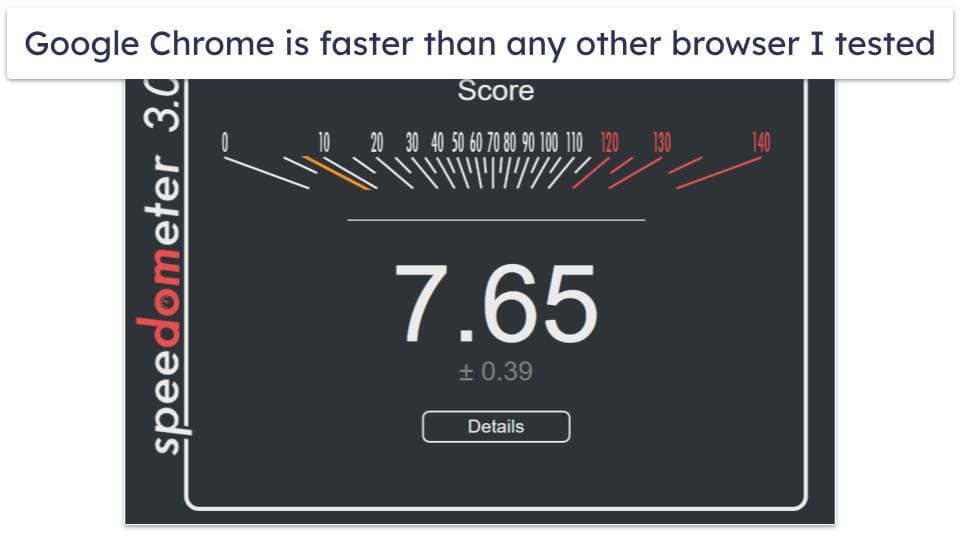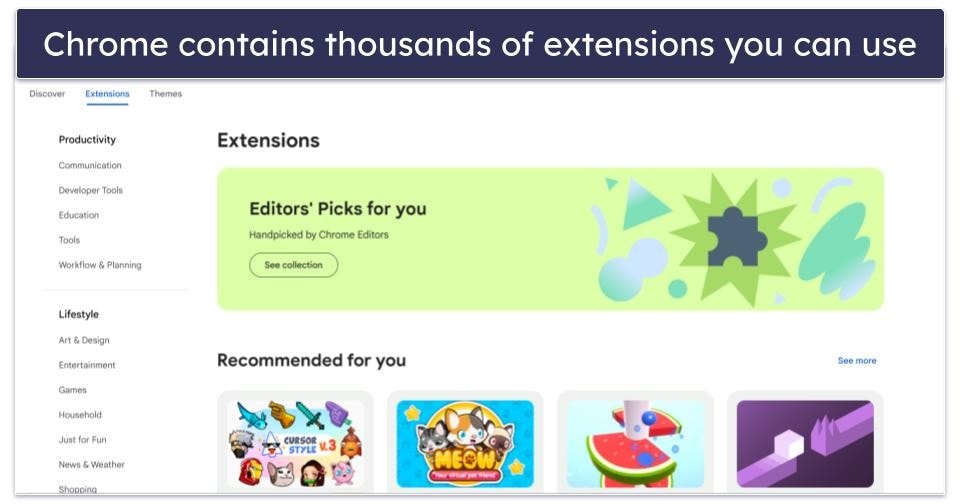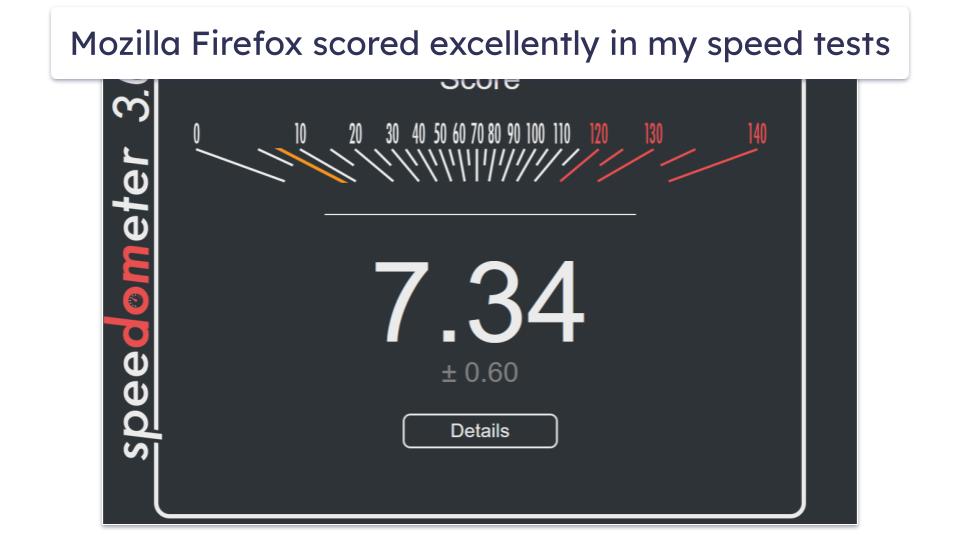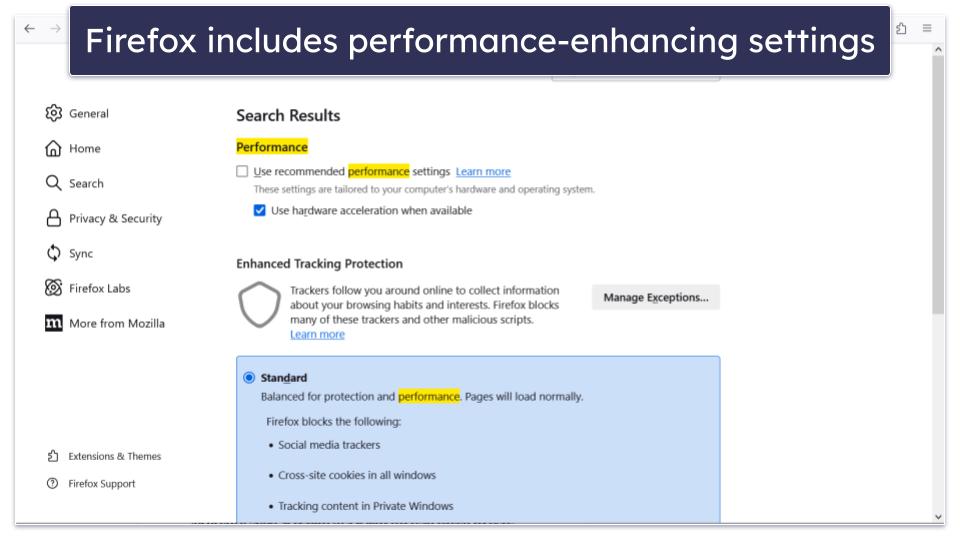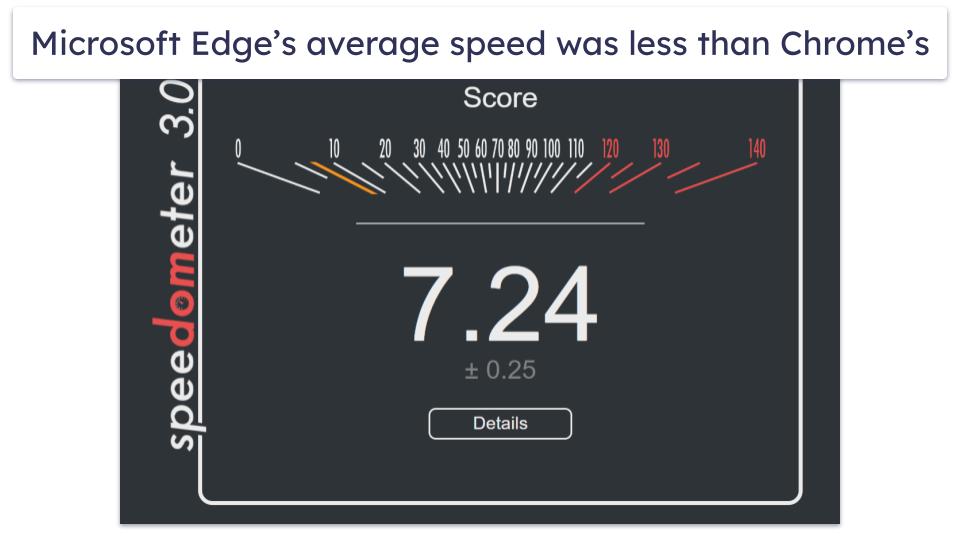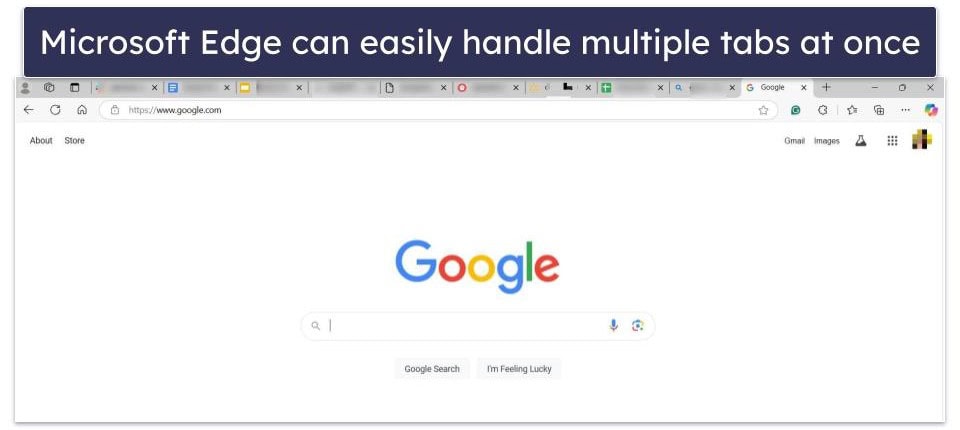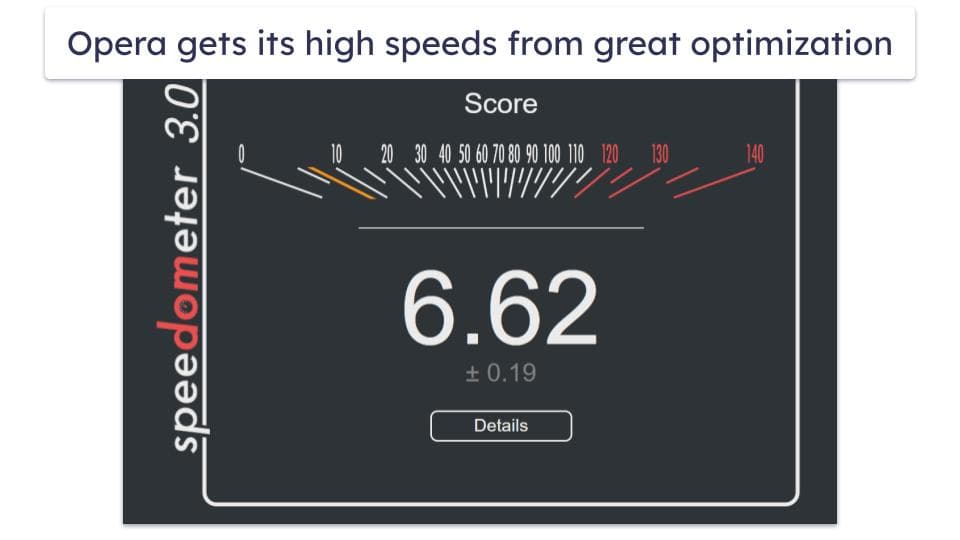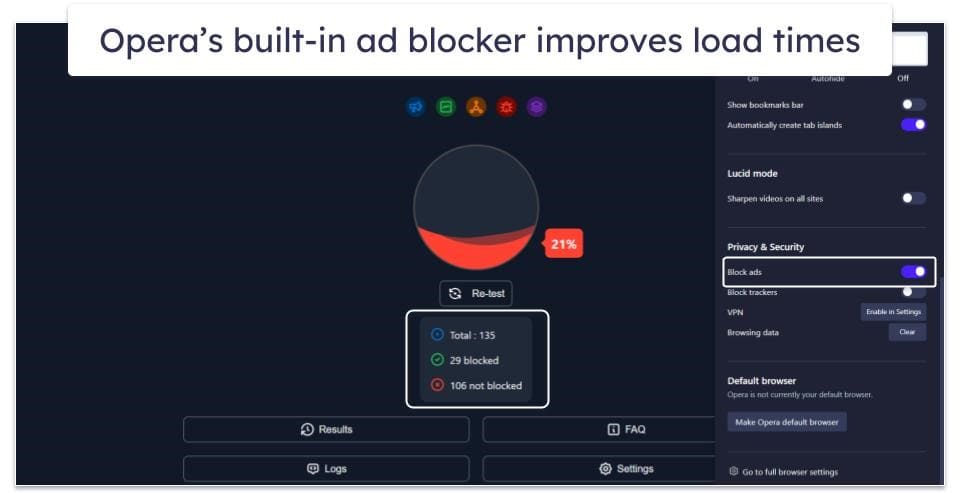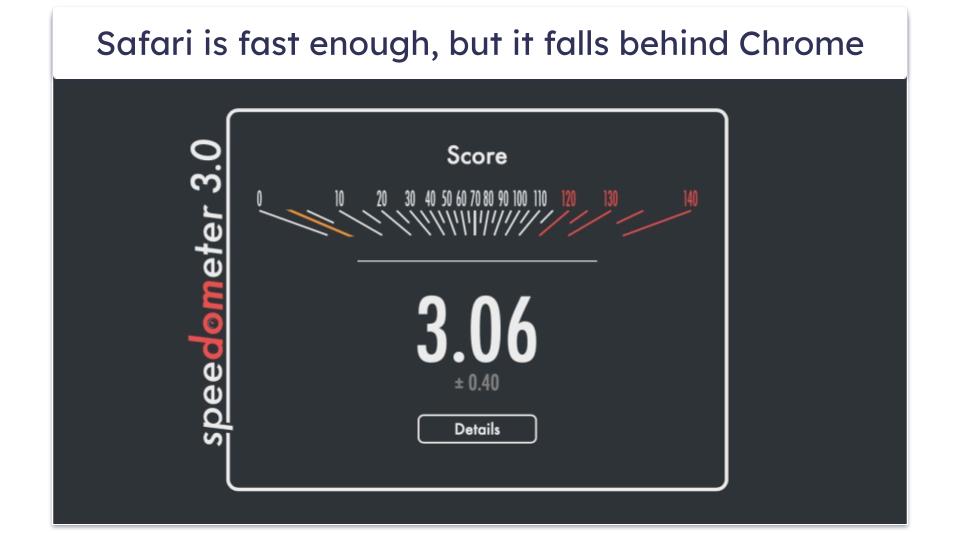
Tyler Cross
Updated on: January 22, 2025
Fact-checked by Kate Davidson
Short on time? Here’s the fastest browser in 2025:
- 🥇Google Chrome: Google Chrome uses the most raw processing power of any popular browser to quickly load complex sites while performing duties in the background that improve browser speed. It can load complex pages in seconds, even if the page has pop-ups, ads, or multiple pages of information.
Slow browsers are extremely annoying and potentially dangerous. If a web client is running slowly, chances are that it’s using outdated tech, can’t access every modern website, and may even have software vulnerabilities that better browsers don’t suffer from. Did I mention that a slow browser is also really annoying?
I created a list of the 5 fastest web browsers to ensure you don’t run into any of these pitfalls. I tested and judged them based on their overall speed, how resource-intensive they are, and how easy they are to install, use, and customize.
Google Chrome (unsurprisingly) had the fastest test results of any browser that I tried. It’s a bit resource-intensive, but its V8 JavaScript engine and optimized memory usage let it open complex websites in seconds (or, if you’re like me, 30+ tabs at once). That said, I found a few other browsers that offer comparable speeds, so you have plenty of options.
Pro Tip: It’s a great idea to use a reliable VPN like ExpressVPN with your browser to protect your online privacy. A VPN can fully encrypt your outgoing network data, meaning that neither Google nor your ISP or the sites you visit can track what you do online. This is particularly helpful when using Chrome, as Google is known to collect a ton of information from its users.
Editors’ Note: ExpressVPN and this site are in the same ownership group.
Quick summary of the fastest browsers:
- 1. 🥇Google Chrome — Fastest overall browser with powerful processing capabilities.
- 2. 🥈Mozilla Firefox — Balances performance with efficient memory usage.
- 3. 🥉Microsoft Edge — Chromium-based & can handle complex websites with ease.
- 4. Opera — Comes with built-in data compression and an ad blocker.
- 5. Safari — Fastest overall browser for Mac and iOS users.
🥇1. Google Chrome — Fastest Browser With Powerful Processing Capabilities
Google Chrome proved to be the fastest browser on the market during my tests. It’s built on the Blink rendering engine and uses a V8 JavaScript engine to process large swathes of data at once without drops in performance. Thanks to the V8 engine, it’s especially good at working with pages built on complex JavaScript.
Chrome also focuses on incorporating the most cutting-edge technology into its browser and has less trouble accessing modern, sophisticated sites than any other browser. It uses advanced techniques like hardware acceleration, which shortens load times and means it can switch seamlessly between tabs.
Chrome also uses an experimental QUIC protocol (shared with Opera) to compensate for HTTP/2 problems. It provides the security of data encryption while increasing your connection speed and reducing overall packet loss. If that sounds too technical, all it means is that Chrome uses a specific architecture to resolve a common compatibility problem that can arise with complicated sites.
Google’s ecosystem is also very well developed. You can sync your browsing history and favorite pages between your phone and computer and take advantage of all of Google’s services, such as Docs and Sheets, from the same account. It’s an indirect speed boost, but it does save time being able to revisit favorite sites on your phone with the tap of a button.
I’m a fan of Chrome’s intuitive user interface, too. It uses a somewhat minimalistic UI that presents important information to you without overloading you with details. It has tons of customization options via unique themes, a battery-saver mode for more efficient long-term use, and more.
Google Chrome has access to thousands of extensions that add features, change the UI, or speed up your browsing experience. You can find extensions that block ads, block trackers, improve your cybersecurity defenses, and a lot more. But if all that sounds too complicated, it still works great “out of the box.”
Chrome isn’t perfect, of course. Due to the amount of powerful technology and background processes at work, it can hog your computer’s resources, so older laptops and phones may struggle. But overall, it’s the best choice if you’re after super fast browsing speeds.
Bottom Line:
Chrome is the fastest browser on the market. Its V8 JavaScript engine gives it more processing power than its competitors, and its optimized memory use helps to keep system resources low. It also has an extensive collection of extensions and themes, giving you a ton of customization options. Not only is Chrome fast, but with a little trial and error, you can give it any feature or tool you want, like a VPN extension. It’s a bit too resource-intensive for low-end devices, but it’s still broadly usable and has an intuitive UI.
🥈2. Mozilla Firefox — Balances Performance With Efficient Memory Use
I’ve always been a fan of Firefox, so I’m happy to report that it did very well in my tests. On average, it was only slightly slower than Google Chrome, but even then, Firefox did load some sites slightly faster. This is due to its excellent anti-tracking features, which stop more of your data from being harvested than Chrome does.
Its anti-tracking prevents websites from loading trackers, cookies, and complex scripts to your device. This has the dual function of both improving your browsing speed (since it reduces the amount of work it takes to fully load the page) and stopping companies from harvesting your data. But this is far from being its only privacy-oriented feature. In fact, Mozilla Firefox is also one of the most secure web browsers you can use.
It owes a lot of its speed to its impressive multi-processor architecture. When Firefox needs to run multiple tabs or complex pages, it runs multiple processes at once. This breaks down and optimizes each process, which in turn boosts how fast it is and makes it demand less of your system resources.
It’s also very beginner-friendly. Mozilla Firefox presents an easy-to-understand UI that doesn’t bombard you with information. For more advanced users, there are many themes and extra add-ons you can install to tweak it even further and give it any feature you need (hint: like a good VPN).
Firefox also has customizable performance settings. You can optimize its speed and memory usage to fit your computer, making it arguably the fastest choice for low-end PCs and phones. But I have to say that, even after optimizing my settings, Chrome still performed better on average.
The biggest drawback to Firefox is that since it isn’t Chromium-based like most of my picks, it’s not compatible with as wide a range of add-ons. The Firefox store has fewer extensions than Chrome or Edge (but more than Safari). There’s still a decent range of Firefox add-ons to choose from, though.
Bottom Line:
Firefox’s Quantum engine makes it one of the fastest browsers you can find, and it just barely lost 1st place to Chrome. Its advantage lies in its strong open-source principles and privacy protections — which, on some tracker-heavy sites, give it a slight speed advantage over Chrome. It can handle resource-intensive websites thanks to its optimized memory usage. Overall, Firefox may lose out just slightly to Chrome on the hardest-to-load websites, but it’s still lightning-fast and perfect for everyday activities.
🥉3. Microsoft Edge — Chromium-Based & Loads Complex Sites With Ease
Microsoft Edge is a faster web browser than I expected. Being the successor to the infamous Internet Explorer gave it a stigma that I was pleasantly surprised to see broken in my tests. It’s built on the Chromium engine and incorporates modern technology in a way that makes it pretty competitive with Chrome.
One feature that I liked more than I expected is its Startup Boost. When you turn on your device, it pre-loads Edge in the background. That way, it automatically opens for you without any delay, even if you’re opening multiple tabs. Since it comes pre-installed on many Windows computers, you can always rapidly connect to a site.
I also like its battery-saving mode that reduces its strain on your computer. While it doesn’t sound like this would translate to a speed boost, it stops background processes and extends your device’s life by enough time that it becomes more efficient over extended sessions.
It also comes with a built-in ad blocker that works pretty well (I prefer Opera’s, but Edge’s ad blocker isn’t bad). Ads can account for up to half of the time it takes to open a site, so having a tool to get rid of them can be very helpful.
Edge is also very easy to use and designed so that total beginners can open it up and start surfing without any problems. That said, its UI is practically identical to Chrome, so it’s not exactly revolutionary. It also has access to most of Chrome’s extensions, but not all of them.
While there’s a lot to like, Edge doesn’t really do anything special in any category. It’s fast, but not the fastest. It’s safe, but not the safest, and it’s customizable… but not the most customizable. It’s like bread at a buffet — a reliable choice that will always be good, but it’s not the best thing on the menu.
Bottom Line:
Microsoft Edge is a lot faster than you might expect. It’s a Chromium-based browser with reliably quick connections and access to most of Chrome’s extensions. It’s easy to use and comes built into many Windows computers. That said, Edge lacks anything that makes it stand out against Chrome or Firefox. But it’s safe, reliable, and a lot faster than I thought it would be.
4. Opera — Comes With Built-In Data Compression and an Ad Blocker
Opera is a great browser “out-of-the-box,” since it’s built on the Chromium engine (like Edge). It achieved fast speeds during my tests and was perfectly capable of processing multiple tabs and complex websites without any major strain on my computer.
But its true strength lies in its extra features. Opera’s mobile browser and Opera Mini both come with built-in data compression tools that reduce the time it takes to load a new web page. Its battery saver mode reduces its strain on your system resources, making it more efficient for longer sessions than other browsers.
You should also turn on Opera’s built-in ad blocker. Ads account for roughly 20%–50% of the time it takes to load a new web page, so turning it on gives you a significant speed boost. In fact, during my tests, I used extremely ad-heavy websites, and in some cases, it even loaded faster than Chrome (though, to be fair, Chrome was faster the majority of the time).
It’s also easy to use, for the most part (more on that later). Its customizable sidebars and pop-out video player are both great features that feel intuitive and somewhat streamline surfing the web. While a customizable sidebar doesn’t inherently improve its speed, there’s an argument to be made that having easily accessible shortcuts indirectly helps in this area.
However, while Opera is great, it has one major drawback. It just doesn’t prioritize cutting-edge technology in the same way that Google Chrome does. Because of this, it can have trouble loading some JavaScript-heavy websites or cause some compatibility issues with modern sites.
Bottom Line:
Opera’s strength lies in its extra features. It’s already pretty fast on its own, but on mobile, its built-in data compression lets it hit speeds that rival Chrome and Firefox. I like its built-in ad blocker as well, which shortens how long it takes ad-filled sites to load. It can struggle with some modern websites, but it does offer the most extra features.
5. Safari — Fastest Overall Browser for Mac & iOS Users
Safari is an excellent choice for Apple product users. It offers a combination of secure privacy features and powerful architecture that’s tailored to macOS and iOS to keep its browsing speeds incredibly fast. It lags behind Chromium-based browsers like Chrome and Edge in terms of pure speed, but it’s more than fast enough to handle everyday tasks.
What sets it apart is excellent Apple-tailored privacy features (several of which directly impact performance). I like its intelligent anti-tracking features, which block website trackers from stealing unneeded data from you. This in turn helps you connect faster.
It’s extremely easy to use as well, with a minimalistic user interface that streamlines browsing. If you have absolutely no experience (meaning you’re not even sure how the internet works yet), Safari presents an easy guide for learning how it all works.
However, Safari does have a few drawbacks. As I mentioned, it’s the slowest browser on my list. If you start multitasking, such as opening numerous tabs or using other applications at the same time, it can get sluggish. It also lacks customization — there are fewer extensions and UI modifications than with any of my other picks.
Bottom Line:
Safari is the best pick for Apple users and comes with some of the best anti-tracking and privacy features you can get without sacrificing too much speed. It’s extremely easy to use, but that comes at a small loss of customization options. While it’s not perfect, Safari is excellent and ranks among the fastest browsers.
Quick Comparison Table
Testing Methodology: Comparison & Ranking Criteria
Here’s how I came up with my list of the fastest browsers:
- Speed. Obviously, I only included browsers that can quickly perform complex operations, such as loading intensive pages or loading multiple tabs at once. While Chrome performed the best in all of my speed tests, all of my picks are reliable and can open the same websites with a 1–2 second difference.
- Memory usage. While this doesn’t matter as much for high-end PCs, memory usage is a key consideration for lower-end devices. I chose browsers that balance performance with good memory usage; that way, you can surf the web without it being too demanding on your system resources.
- Privacy and customization features. Believe it or not, privacy features actually improve browsing speed. My top picks all come with private browsing options and block trackers (trackers slow down your browsers by a lot more than you’d expect). Opera also comes with a built-in ad blocker and VPN mode, giving you more control over your privacy than any other browser on my list (though using the VPN mode sacrifices some speed).
- Add-ons and extensions. Add-ons and extensions are used to tailor your browser to fit your needs. Google Chrome, for example, has thousands of extensions you can install to change your default pages, give yourself extra features, and otherwise modify your browser. Many of these, like good ad blockers, can directly improve your browsing speed.
- Ease of use. You can install any of my top picks and start browsing within 5 minutes without any hidden costs or confusing roadblocks.
What Makes a Web Browser Fast?
A lot of variables go into making a fast web client, including a ton of highly technical operations constantly being performed “under the hood” of your browser. Some of these include:
- Efficient rendering engine: A browser’s rendering engine, like Chrome’s V8 or Firefox’s Quantum, determines how quickly it processes and displays web content. Even if everything else is optimal, your client will still run slowly without an effective engine.
- Memory management: Browsers that use memory more efficiently prevent slowdowns, especially with multiple tabs open. Especially for lower-end devices, proper memory management prevents the browser from overloading your resources.
- JavaScript optimization: Modern websites rely heavily on JavaScript, so browsers with optimized engines handle these scripts faster. The best example is Google Chrome, which is built using JavaScript and works with other JavaScript programs better than other browsers with similar speeds.
- Data compression and caching: Techniques like caching frequently visited pages and compressing data (i.e., in Opera’s data compression) speed up loading times.
- Hardware acceleration: My top picks use your computer’s GPU to render graphics and animations. This offloads work from the CPU, improving performance. However, relying on acceleration too much drains system resources, making it a balancing act between resources and speed.
- Frequent updates: Regular updates ensure compatibility with the latest web standards and performance improvements. If the browser doesn’t get frequent updates, it’s more likely to be vulnerable to threats (both known and unknown).
Why You Should Have a Fast Browser
There are a lot of benefits to having a fast browser, but they ultimately boil down to it being more convenient for you. Unless you somehow enjoy waiting for several minutes for a page to load up, there are only positives. This includes:
- Improved productivity: Faster loading times help you complete tasks and switch between sites without delays. Websites get more and more complex as time goes on, leaving slower browsers unable to perform simple operations, like opening a link, without a significant delay.
- Better multitasking: Efficient browsers allow you to keep multiple tabs open at once and seamlessly switch between them. The same is true for other apps — a fast browser can also support a game, streaming service, or work-related app running at the same time without any problems.
- Reduced battery drain: Fast, optimized browsers use less processing power, which can extend battery life on laptops and mobile devices. Slower and less effective browsers are a huge drain on system resources. Powerful browsers like Google Chrome balance fast speeds with their need for processing power, while offerings like Microsoft Edge are slightly slower but easier on your system.
- Access modern web content: A lot of modern websites require a modern browser to access them, meaning older options simply won’t be able to do as much as Chrome, Firefox, or any option on my list.
- Security concerns. Slow and outdated browsers typically rely on older technology that is easier to hack. If you’re using an old and bulky web client, you’re significantly more exposed to all kinds of threats.
Top Browsers That Didn’t Make the Cut
- Internet Explorer. Internet Explorer is both very slow and largely discontinued. While it’s still possible to use Explorer, its speeds have fallen so far behind other modern browsers that there’s simply no reason to. Due to its discontinuation, it’s also easy for hackers to exploit and infect your computer with dangerous browser-based viruses like redirects or fake extensions.
- DuckDuckGo. DuckDuckGo is a great browser (it’s even one of my go-to’s), but it simply didn’t keep up with my top picks when it came to speed. It’s definitely a great choice when it comes to online privacy, though.
- Vivaldi. Vivaldi prioritizes customization options at the expense of speed. It’s by no means unusable or bad; it just doesn’t quite qualify as “one of the fastest.”
Frequently Asked Questions
What should I consider when picking a web browser?
I looked at 5 key metrics when determining my list of the fastest browsers: the browser’s speed (of course), its privacy features (i.e. blocking trackers gives a direct performance boost), its memory usage, extension compatibility, and overall ease of use. In general, a great browser will perform well in 3 to 4 areas at a time.
Can a web browser be fast and safe at the same time?
Yes! And I wouldn’t recommend a fast browser that wasn’t safe. Google Chrome, for example, uses a powerful V8 JavaScript engine to process tons of information nearly instantly. At the same time, it comes with pretty good built-in anti-phishing protection that helps you avoid scams and malicious websites.
You can also use extensions and add-ons to significantly improve your browser’s security. For example, you can install something like Norton’s secure web browser to provide an extra layer of anti-phishing and malware protection.
Which web browser is the fastest and why?
Google Chrome is the fastest web browser in 2025, thanks to its impressive JavaScript architecture and overall processing power. While it can be intensive on system resources, it’s able to open up multiple tabs of highly complex websites with ease.
Why do I need a fast web browser?
Everyone should use a fast web browser for both convenience and security reasons. Normally, if a browser is slow, it’s because it uses out-of-date technology that impedes your ability to open web pages normally. That tech may have known exploits that other companies have long since fixed. You also can’t access modern websites on browsers that aren’t advanced enough to support them.
That’s why I recommend installing Google Chrome or any of my top picks. Their modern architecture gives them ample processing power to open up new websites in the blink of an eye, plus you don’t need to worry about potential security risks.




